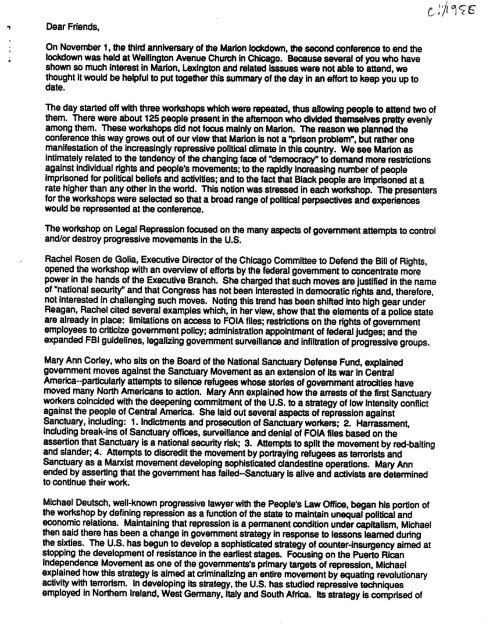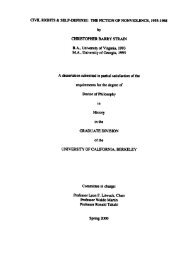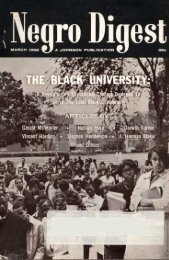Letter to Friends - Freedom Archives
Letter to Friends - Freedom Archives
Letter to Friends - Freedom Archives
You also want an ePaper? Increase the reach of your titles
YUMPU automatically turns print PDFs into web optimized ePapers that Google loves.
Dear <strong>Friends</strong>,<br />
On November 1, the third anniversary of the Marion lockdown, the second conference <strong>to</strong> end the<br />
lockdown was heldatWelling<strong>to</strong>n Avenue Church inChicago. Because several of youwho have<br />
shown so much interest in Marion, Lexing<strong>to</strong>n and related isssues were not able <strong>to</strong> attend, we<br />
thought it would be helpful <strong>to</strong> put <strong>to</strong>gether this summary ofthe day in aneffort <strong>to</strong> keep you up<strong>to</strong><br />
date.<br />
The day started offwith three workshops which wererepeated, thus allowing people <strong>to</strong> attend two of<br />
them. There were about 125 people present in the afternoon who divided themselvespretty evenly<br />
among them. These workshops did not focus mainly on Marion. The reason we plannedthe<br />
conference thisway growsout of ourviewthat Marion is not a "prison problem", but rather one<br />
manifestation of the increasingly repressive political climate inthis country. We see Marion as<br />
intimately related <strong>to</strong> the tendency of the changing face of"democracy" <strong>to</strong> demand more restrictions<br />
against individual rights and people's movements; <strong>to</strong>the rapidly increasing number of people<br />
imprisoned for political beliefs and activities; and <strong>to</strong>the fact that Black people are imprisoned ata<br />
rate higher than anyother in the world. This notion was stressed in eachworkshop. The presenters<br />
for theworkshops were selected so that a broad range of political perpsectives and experiences<br />
would be represented at the conference.<br />
The workshop on Legal Repression focused onthe many aspects ofgovernment attempts <strong>to</strong> control<br />
and/or destroy progressive movements in the U.S.<br />
Rachel Rosen de Golia, Executive Direc<strong>to</strong>r ofthe Chicago Committee <strong>to</strong> Defend the Bill of Rights,<br />
openedthe workshop with an overview of efforts by the federal government <strong>to</strong> concentrate more<br />
power in the hands ofthe Executive Branch. She charged that such movesare justified in the name<br />
of"national security0 and that Congress hasnot been interested in democratic rights and, therefore,<br />
not interested in challenging such moves. Noting this trend hasbeenshifted in<strong>to</strong> high gear under<br />
Reagan, Rachel cited several examples which, in her view, show that theelements ofa police state<br />
are already in place: limitations onaccess <strong>to</strong> FOIA files; restrictions onthe rights ofgovernment<br />
employees <strong>to</strong> criticize government policy; administration appointment of federal judges; and the<br />
expanded FBI guidelines, legalizing government surveillance and infiltration of progressive groups.<br />
Mary Ann Corley, who sits on the Board ofthe National Sanctuary Defense Fund, explained<br />
government moves against the Sanctuary Movement as an extension of its war in Central<br />
America-particulariy attempts <strong>to</strong> silence refugees whose s<strong>to</strong>ries ofgovernment atrocities have<br />
moved many North Americans <strong>to</strong>action. Mary Ann explained how thearrests ofthe first Sanctuary<br />
workers coincided with thedeepening commitment ofthe U.S. <strong>to</strong>a strategy of low intensity conflict<br />
against the people ofCentral America. She laid out several aspects ofrepression against<br />
Sanctuary, including: 1. Indictments and prosecution ofSanctuary workers; 2. Harassment,<br />
including break-insof Sanctuary offices,surveillance and denial of FOIA files based on the<br />
assertion that Sanctuary isa national security risk; 3. Attempts <strong>to</strong>split the movement by red-baiting<br />
and slander; 4. Attempts <strong>to</strong> discredit the movement by portraying refugees as terrorists and<br />
Sanctuary asa Marxist movement developing sophisticated clandestine operations. Mary Ann<br />
ended by asserting thatthe government has failed-Sanctuary is alive and activists are determined<br />
<strong>to</strong> continue their work.<br />
Michael Deutsch, well-known progressive lawyer with the People's Law Office, began his portion of<br />
the workshop by defining repression as a function of the state <strong>to</strong> maintain unequal political and<br />
economic relations. Maintaining that repression isa permanent condition under capitalism, Michael<br />
then said there has been a change in government strategy in response <strong>to</strong> lessons learned during<br />
the sixties. The U.S. has begun <strong>to</strong>develop a sophisticated strategy ofcounter-insurgency aimed at<br />
s<strong>to</strong>pping the development of resistance in the earliest stages. Focusing onthe Puer<strong>to</strong> Rican<br />
Independence Movement as oneofthe government's primary targets ofrepression, Michael<br />
explained how this strategy isaimed atcriminalizing an entire movement byequating revolutionary<br />
activity with terrorism. In developing its strategy, theU.S. has studied repressive techniques<br />
employed in Northern Ireland, West Germany, Italy and South Africa. Its strategy iscomprised of
many facets, including: developing new laws; revising old ones; expanding the use of technological<br />
intelligence; and using informants. He specifically addressed the issues of Grand Juries as a<br />
method of arresting and detaining activists without trial, and the Bail Reform Act which means those<br />
arrested can be held without bond ifthe governmentsays they are a danger <strong>to</strong> the communityora<br />
risk of flight.<br />
Inthe workshop on Political Prisoners and Prisoners of War, Barbara Zeller of the Committee <strong>to</strong><br />
Fight Repression began by placing North American anti-imperialist prisoners inthe his<strong>to</strong>ry of the<br />
last five years of those who saw the need <strong>to</strong> mount armed actionsagainst the U.S. war machine,<br />
acting in solidarity with peoples of Central America, Azania/South Africa, and New Afrikan/Black<br />
and Puer<strong>to</strong> Rican people here. These people are facing a "denial" system-denied access <strong>to</strong> media,<br />
denied visits from supporters and family, and denied political legitimacy. In a theme that would be<br />
repeated, she stressed that this was the state's attempt <strong>to</strong> break people who s<strong>to</strong>od for some of the<br />
fundmental principles of an anti-imperialistmovement.<br />
Next, Chokwe Lumumba, Chairperson of the New Afrikan People'sOrganization, urged us <strong>to</strong><br />
grapple withthe political contradiction that arose when Europeans first enslaved Africans. This<br />
colonial experience, sometimes open, sometimes masked, taking on different forms during several<br />
hundred years, has alwayscreatedthe resistance of those called political prisoners and prisoners<br />
of war-from Nat Turner <strong>to</strong> <strong>to</strong>day's prisoners of warof the Black Liberation Army. The Black<br />
Liberation Army, he pointed out, acted against killer cops and drug dealers, and expropriated<br />
money <strong>to</strong> support community action programs as wellas African liberation movements. Support for<br />
them is not just a matter of "civil liberties" but of Black freedom.<br />
Bob Bossie is a member of the Eighth Day Centerfor Justice and a spokesperson for the<br />
Plowshares activists. He pointed out that 1,000 peoplea week are being imprisoned due <strong>to</strong> the<br />
economic and political circumstances in the U.S., and the repression of those who struggle. The<br />
Plowshares activists said "No" <strong>to</strong> the violence of U.S. weapons and their victims. Bob pointed out<br />
that many white middle-class people areconstantly facing society's attempt<strong>to</strong> break ourwills and<br />
ourconsciences through manipulation orcoercion. He urgedus <strong>to</strong> break through our fear and<br />
speak out. And when we see people like Nelson Mandela, Leonard Peltieror Rafael Cancel<br />
Miranda, we must notdistance ourselves from them by setting them up as heroes, orletting the<br />
government make them objects of derision as criminals. We, also, should refuse <strong>to</strong> let our hearts<br />
and wills be coerced.<br />
The last speaker, Jaime Delgado, Chairperson of the National Committee <strong>to</strong> Free Puer<strong>to</strong> Rican<br />
Prisoners of War, is currently under Federal indictment for allegedly conspiring <strong>to</strong> aid a prison<br />
escape. He echoed that the government tries <strong>to</strong> break our will <strong>to</strong> act; and added that we sometimes<br />
undermine our own will by underestimating what has <strong>to</strong> be done. As the state shuts off more<br />
options for legal change, and the prisons become harsher and harsher, the prison system itself<br />
becomes a <strong>to</strong>ol of counter-insurgency against allwho dare <strong>to</strong> make a decision <strong>to</strong> act. Jaime said<br />
that since prisons are the point of confrontation between those who act and the state, Marion and<br />
Lexing<strong>to</strong>n must become rallying points for our movements. <strong>Freedom</strong> Fighters continue <strong>to</strong> represent<br />
<strong>to</strong> the state what the movement is trying<strong>to</strong> do, so the state reacts by trying <strong>to</strong> break their will <strong>to</strong><br />
struggle through isolation and mistreatment. They also use prisons <strong>to</strong> try <strong>to</strong> weaken the<br />
revolutionary movements by attacking and repressing those who support their sisters and brothers<br />
in prison. But these <strong>Freedom</strong> Fighters, Jaime concluded <strong>to</strong> loud applause, are proof that the state is<br />
not all-powerful, and are examples of the strength and will of the people.<br />
The presenters in the workshop on the Changing Nature of the U.S. Prison System gave talks that<br />
dovetailed rather nicely. Joan McCarty, longtime prison activist and Direc<strong>to</strong>r of the Prison Workshop<br />
Players, read and discussed in detail a long letter from a collective of Black prisoners at Stateville, a<br />
maximum security state prison in Illinois, in which they gave their perceptions of how things have
changed over the years in which they have been incarcerated in the Illinois prison system. They<br />
watched as the "rehabilitation" model went out the window in favor of warehousing. They watched<br />
the prison administra<strong>to</strong>rs respond <strong>to</strong> overcrowdingby spending vast sums on guard <strong>to</strong>wers, as the<br />
population grew younger and more involved with gang violence. Joan was able <strong>to</strong> supplement their<br />
observations with her own as a long time prison activist and her observations were very timely.<br />
Steve Whitman, a member of the Committe <strong>to</strong> End the Marion Lockdown was able <strong>to</strong> gather<br />
<strong>to</strong>gether data from government sources and the United Nations <strong>to</strong> document the disproportionate<br />
imprisonmen<strong>to</strong>f Black people - at a rate six times that for white people - a rate higher than any other<br />
in the world! The fact of who is in prison gives great insightin<strong>to</strong>what the purpose of prisons must<br />
be. Jose Lopez, national coordina<strong>to</strong>r of the Movimien<strong>to</strong>de Liberation National - Puer<strong>to</strong> Rico<br />
(MLN-PR), spoke afterSteve with a theoretical analysis of the changing natureof the prison system.<br />
His talkcoincided with Steve's ina very interesting way. Jose dated major changes inthe "criminal<br />
justice system" <strong>to</strong> 1965, the year of the assassination of Malcolm X and the establishment of the<br />
Uniform Criminal Justice Code. This was just about the time that Steve's data showed the<br />
beginning of dramatic increases inthe number of people imprisoned by the U.S.<br />
After the workshops, Steve Robideaux, a leader of the Leonard Peltier Defense Committee, was<br />
able <strong>to</strong> s<strong>to</strong>p by and give a talk <strong>to</strong> the entire conference on the status of Leonard's case and the<br />
Native American struggle. Following Steve's talk, we showed a video of four Puer<strong>to</strong> Rican women<br />
Prisoners of War talking<strong>to</strong>gether from Pleasan<strong>to</strong>n Federal Prison about the racism and alienation<br />
from "mainstream America" thatbrought them <strong>to</strong> the struggle, about special issues of women in the<br />
struggle, about their<strong>to</strong>taldedication<strong>to</strong> Puer<strong>to</strong> Ricanindependence and socialism, and about the<br />
especially harsh prison conditions they have faced in U.S. control units.<br />
Afterthe video, we all shared a delicious dinner served by the Puer<strong>to</strong> RicanCultural Center and<br />
thenwent upstairs <strong>to</strong> the sanctuary ofthe church <strong>to</strong> see a dramatic performance by the Prison<br />
Workshop Players. Their performance showed the effects of prison on Black people-their families,<br />
loved ones, and political leaders. Their moving portrayals made itdear thatprisons attack the fabric<br />
of Black society and family life. Following the performance, we gathered <strong>to</strong>gether for the evening<br />
panel on Marion prison.<br />
The Marion panel was slated for this timeslot in order <strong>to</strong> highlight itatthe conference. Thistime,<br />
with about 90 people in the room, the presenters all gave very powerful, moving testimony <strong>to</strong>the<br />
horrors of Marion, <strong>to</strong>the fact that the Lexing<strong>to</strong>n Control Unit had just opened and wasalready more<br />
barbaric than Marion, and <strong>to</strong>the political significance oftheseissues. Members ofthe panel<br />
included Nancy Horgan, an at<strong>to</strong>rney for Marion prisoners, Michael Deutsch and Chokwe Lumumba,<br />
who had spoken in workshops earlier in theday, and Jan Susler, an at<strong>to</strong>rney with the Peoples Law<br />
Office. Each speaker addressed the problem of Marion from her or his unique perspective based<br />
upon substantial experience. They not only focused on the brutal conditions,but also on the<br />
questions of strategy andaction that would change these conditions. Although the formal<br />
discussion did notend until after 10:00 PM, people still stayed and askedmanyquestions.<br />
Many good things came out oftheconference. First, theword about Marion and Lexing<strong>to</strong>n and<br />
Control Units is definitely getting around. Last year atthis time, virtually no one outside of our small<br />
circle knew ofsuchthings. Now such knowledge is more common. Second, we onceagain had a<br />
substantial collection of literature on the <strong>to</strong>pics ofthe conference and on related <strong>to</strong>pics as well and<br />
many of the people at the conference <strong>to</strong>ok free literature and purchased other books and<br />
pamphlets. Third, attendance was good. We estimate that about 175 people were present at one<br />
time or another and many of them were new people who we had never met but who were attracted<br />
by our leafletting, by notices that were placed in newspapers, and by signsthatwerehung around<br />
universities. Fourth, the presentations were generally ofvery high quality. All were prepared in<br />
advance and contained a great deal of new information presented in a coherent and meaningful<br />
manner. Fifth, we produced a newbrochure which is available for general distribution. Finally, we<br />
had two main activities <strong>to</strong> build for offoftheconference. Onewas a petition drive which is
demanding an end <strong>to</strong> the lockdown, adosing of all control units, and the s<strong>to</strong>pping ofselective<br />
mistreatment of political prisoners and prisoners ofwar. The other was the demonstration that was<br />
planned for December 6.<br />
Despite the cold and rain, approximately 175 people turned out for the December 6 demonstration.<br />
After gathering atnoon for a short picket and rally, we marched through Chicago's down<strong>to</strong>wn<br />
shopping area. The sidewalks were filled with Christmas shoppers who s<strong>to</strong>pped looking in<strong>to</strong><br />
decorated display windows long enough <strong>to</strong> read our colorful banners and <strong>to</strong> take leaflets explaining<br />
the demonstration. Our major goals for the demonstration were <strong>to</strong> make more people aware ofthe<br />
lockdown at Marion and the opening ofthe women's Control Unit at Lexing<strong>to</strong>n, aswell asdrawing<br />
attention <strong>to</strong>the existence ofand theselective mistreatment of political prisoners and prisoners of<br />
war. We thinkthe demonstration succeeded in these goals.<br />
The march wound itsway <strong>to</strong> the Metropolitan Correctional Centerwhich embodies the Bureau of<br />
Prisons. Oscar Lopez, Puer<strong>to</strong> Rican Prisoner ofWar, and Kojo Bomani Sababu, New Afrikan<br />
Prisoner of War, are currently incarcerated at MCC awaiting trial for an alleged escape attempt from<br />
Leavenworth Penitentiary. They have been held at MCC ininhuman conditions that have been the<br />
focus of a campaign led by the National Committee <strong>to</strong> Free Puer<strong>to</strong> Rican Prisoners of War. At this<br />
point, we held a spirited picket and rally with statements from several groups which were among<br />
those endorsing the demonstration. They induded speakers from the American <strong>Friends</strong> Service<br />
Committee, the Chicago Religious Task Force on Central America, Synapses (a religious-based<br />
community organization that carries outactivities in solidarity with the peoples ofCentral America,<br />
the Philippines, South Africa.), The Blacks in Law and Criminal Justice Clubs, and No Pasaran, a<br />
women's affinity group. A family member ofone ofthe imprisoned Plowshares activists spoke, and<br />
we were honored <strong>to</strong> have the Rev. Ben Chavis, former political prisoner in the case ofthe<br />
Wilming<strong>to</strong>n 10 and currently Direc<strong>to</strong>r of the United Church of Christ's Commission on Racial<br />
Justice. Rev. Chavis exhorted all within earshot <strong>to</strong> work <strong>to</strong> get all freedom fighters out ofjail, and <strong>to</strong><br />
put the real criminalssuch as Reagan behind bars.<br />
All in ail wethink theconference, thedemonstration, and our general organizing, have been<br />
successful. But ofcourse, this is only the beginning. We need more people onthe Committee; we<br />
need people <strong>to</strong>sign the petition, and weneed money. Most importantly, weneed more people who<br />
understand the meaning ofControl Unit prisons and who are willing <strong>to</strong> act on this understanding.<br />
The situation at Marion and Lexing<strong>to</strong>n demands our attention. We can succeed in changing things.<br />
We must succeed inchanging things.<br />
The Committee <strong>to</strong> End the Marion Lockdown has some additional literature that wewould be happy<br />
<strong>to</strong> send <strong>to</strong> interested people. If you would like suchinformation, please drop us a note. We would<br />
also appreciate any suggestions, comments or criticisms from you ofour work. We have only limited<br />
capacity right now <strong>to</strong> answer suchcorrespondence, butwe will certainly read and seriously<br />
consider all input.<br />
For Justice and Peace,<br />
The Committee <strong>to</strong> End the Marion Lockdown
















